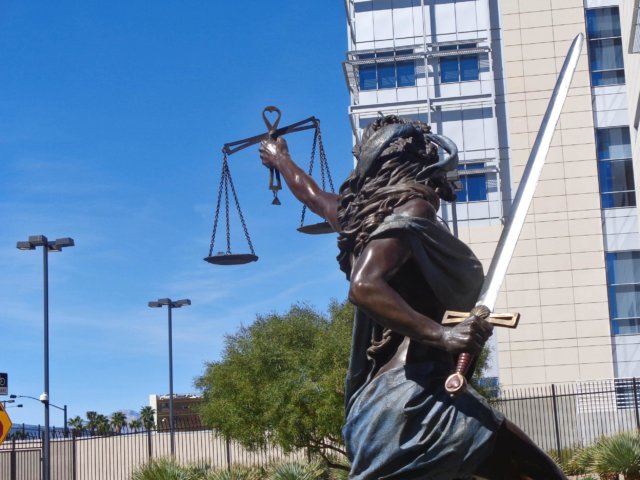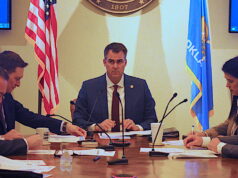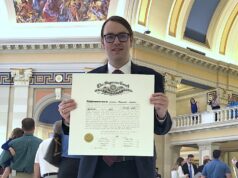
On Tuesday, Oklahomans will head to the polls and decide whether to approve the state’s first regulated and taxed medical-marijuana industry. Lawyers have no special qualifications to opine on weighty social issues, and I do not write to influence readers’ votes.
As public debate about the issue intensifies, however, many of those opposing the proposal have presented demonstrably false legal arguments about its ramifications.
That’s why I have compiled the most common of those arguments and explained why they are misleading. Oklahomans deserve an honest discussion of this momentous question.
1. SQ 788 is medical only in name. This is recreational marijuana.
The hallmark of a recreational-marijuana law is that it allows any person of legal age to obtain marijuana products with no questions asked. The hallmark of a medical-marijuana law is that a person can only obtain marijuana products if they carry a license issued by the state and obtained on the recommendation/approval of a doctor. SQ 788’s Section 1(M) expressly requires that a person obtain the approval of a board-certified physician before securing a license from the state to purchase marijuana. Without question, then, SQ 788 proposes medical marijuana, not recreational marijuana.
Follow @NonDocMedia on:
2. There are no qualifying medical conditions, so anyone could get a license
SQ 788 does not require that a person be diagnosed with any particular medical condition to obtain a doctor’s approval to use medical marijuana. Instead, Section 1(M) requires that the doctor making that recommendation do so “… according to the accepted standards a reasonable and prudent physician would follow when recommending or approving any medication.” If SQ 788 passes, it will not be the case that absolutely anyone who can “articulate a medical need” will be granted a license. In fact, the phrase “articulate a medical need” does not even appear in the text of SQ 788. Rather, any person seeking such a license will be required to obtain the approval of a doctor who, in the ordinary exercise of professional care, determines the patient would benefit from that treatment.
Notably, this is how the law treats any other medical therapy. I am not legally required to suffer any particular medical condition to obtain Xanax or Adderall or to have my leg amputated. In each case, I have to obtain the recommendation of a doctor who, using their professional judgment, believes I would benefit from the proposed treatment. Arguably, placing the emphasis on a doctor’s professional judgment rather than a qualifying condition is a stronger form of regulation. It requires that a physician do more than simply confirm a prior diagnosis and instead evaluate the appropriateness of medical-marijuana treatment for every patient who seeks it regardless of the ailment or symptom the patient reports.
Most other states require that a license holder certify diagnosis of a particular medical condition. Most of these states are frequently expanding those lists, leaving doctors and their patients waiting for lawmakers to catch up with the latest medical research. SQ 788 avoids this result by putting the decision in the most qualified hands: those of a physician. Also, in many states that do list qualifying conditions, regulations also permit a doctor to recommend medical-marijuana treatments for other non-qualifying conditions if the doctor determines it would be appropriate.
Oklahoma would not be the only state to empower doctors in this way. Massachusetts, for example, permits recommendation for several identified conditions “… and other conditions as determined in writing by a qualifying patient’s physician.” California’s law lists qualifying conditions but also authorizes treatment for any other “persistent” symptom that limits “major life activities” or “… if not alleviated, may cause serious harm to … physical or mental health …”. Washington, D.C. similarly defines qualifying conditions to include “… any condition for which treatment with medical marijuana would be beneficial, as determined by the patient’s authorized practitioner.”
3. SQ 788 would allow veterinarians to recommend medical marijuana.
No, it would not. As explained above, SQ 788’s Section 1(M) requires that medical-marijuana treatments be approved by a “Board certified physician.” Oklahoma law defines a “physician” to include a medical doctor, osteopath, dentist, optometrist, chiropractor or podiatrist. A veterinarian is not included in this definition.
Additionally, Oklahoma law establishing the rules of professional conduct for veterinarians also prohibits:
… prescribing or dispensing, delivering, or ordering any veterinary prescription drug or controlled dangerous substance without first having established a veterinarian/client/patient relationship and determining that such prescription drug is therapeutically indicated for the health or well being of the animal (emphasis added).
Oklahoma law simply prohibits veterinarians to prescribe drugs to humans outside of their care, and SQ 788 would do nothing to change this.
4. SQ 788 would allow users to smoke marijuana in public places.
Oklahoma law prohibits “smoking” in most public places, even Thunder games, and indoor workplaces. It defines “smoking” to include “the carrying by a person of a lighted cigar, cigarette, pipe or other lighted smoking device (emphasis added).” Again, SQ 788 would not affect this well-established law.
If you remain unconvinced, consider that California permits fully recreational marijuana and is home to four NBA teams. Smoking (tobacco or marijuana) is prohibited at any of those teams’ home games.
5. SQ 788 permits possession of way more marijuana than other medical states.
SQ 788’s Section 1(A) would permit licensed users to possess up to three ounces on their person and eight ounces in their residences. California permits licensed patients to possess up to eight ounces on their person but also permits physicians to authorize additional amounts. In New Mexico, the limit is also eight ounces. Massachusetts allows a “sixty-day supply,” determined to equal 10 ounces, and Oregon authorizes possession of 24 ounces of medical marijuana. Oklahoma’s proposed possession limits do not radically exceed those enacted in many other medical-marijuana states.
6. Students will be allowed to grow marijuana in their dorm rooms.
Actually, medical marijuana may receive no protection at all on college campuses. Most universities receive federal funding, and marijuana remains illegal under federal law. While SQ 788 purports only to protect Oklahoma students from being denied enrollment based on medical-marijuana licenses, Section 6(A) explicitly exempts any school that would lose a federal grant or license if it complied.
7. There needs to be more regulation; let’s do this right.
There will be more regulation. Already, legislative proposals for a regulatory agency have emerged. If SQ 788 passes, you can be sure that one or more state departments will adopt a wide variety of regulations on the industry, and Gov. Mary Fallin has said she expects to call the Legislature in for a special session if SQ 788 passes. Furthermore, the question only legalizes medical marijuana; the process of creating rules to govern the industry is likely to accelerate after passage. Most, if not all, of the public’s concerns about SQ 788 can be addressed in either the legislative or rule-making process.
This may be the best shot
That said, if you want medical marijuana in Oklahoma but are hoping a “more perfect” solution will prevail, you might be kidding yourself. Those who organized support and gathered signatures for SQ 788 tried for several years before successfully putting this before the voters. They then fought a protracted legal battle with the attorney general to preserve the integrity of the ballot language. Our Legislature’s track record of accomplishing major policy changes should discourage any hope that a comprehensive measure will emerge from the Capitol without voters passing SQ 788.
Put simply, you shouldn’t take for granted that another, better proposal for medical marijuana will follow if SQ 788 is defeated. If you believe Oklahomans should have access to medical marijuana, this may be the Sooner State’s best shot at reform.





















